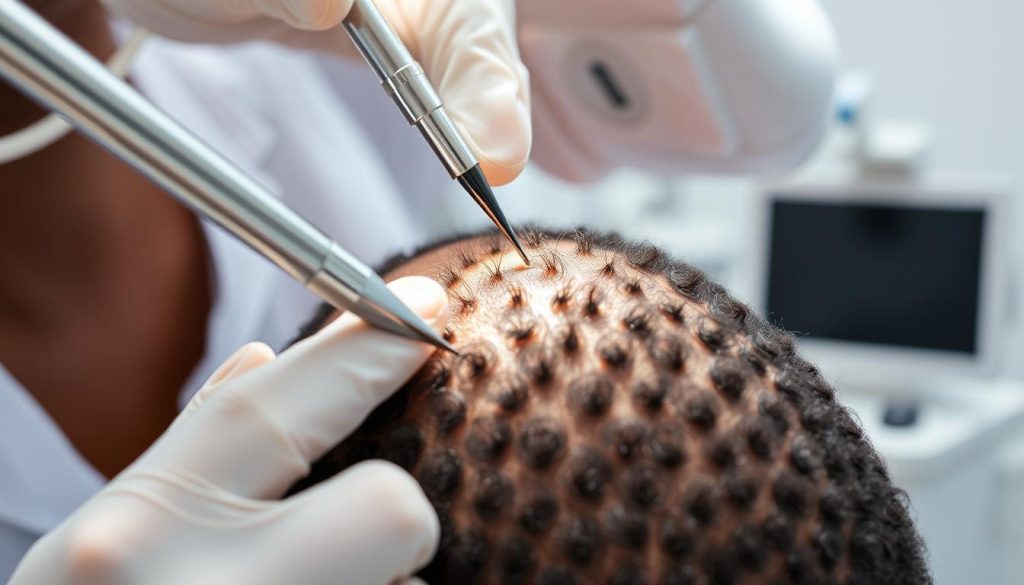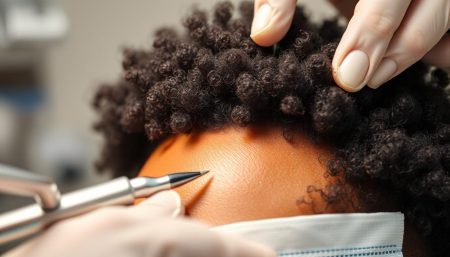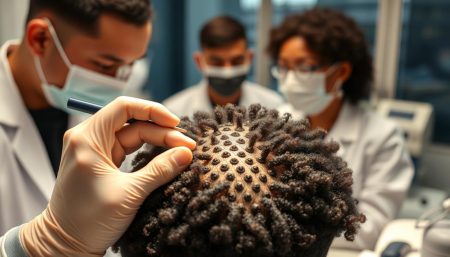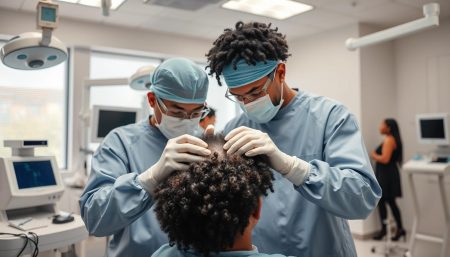Hair loss is tough for anyone, but it’s even harder for African Americans. Black hair grows differently, needing special care in hair restoration. Now, there are expert solutions for Afro-American hair transplants, giving hope for a natural look.
Black hair restoration has made big strides. Experts have created methods just for ethnic hair. These methods make sure the new hair looks like it belongs, blending perfectly with the rest.
Every detail in an ethnic hair transplant is thought out. From matching curl patterns to carefully picking follicles, it’s all about the patient’s hair type. Let’s dive into the science behind these procedures and the best ways to restore hair.
Understanding African American Hair Structure and Growth Patterns
African American hair is special because of its unique traits. These traits affect how hair loss happens and how african-american hair loss treatment is done. Let’s dive into the world of ethnic hair structure and growth patterns.
Unique Characteristics of Black Hair Follicles
Black hair follicles are curved, leading to curly or coily hair. This shape makes them more fragile and prone to breakage. The scalp’s natural oils struggle to reach the hair shaft, causing dryness.
Natural Growth Cycles in Ethnic Hair
Ethnic hair grows slower than other hair types. It grows about 0.2 to 0.3 inches per month, slower than 0.5 inches for others. This slower growth affects the timeline for textured hair transplantation.
Common Hair Loss Patterns in African Americans
Hair loss patterns in African Americans are different from others. Traction alopecia, caused by tight hairstyles, is common. Central centrifugal cicatricial alopecia (CCCA) is also unique, affecting many African American women.
| Hair Loss Pattern | Prevalence | Common Causes |
|---|---|---|
| Traction Alopecia | High | Tight hairstyles, weaves |
| CCCA | Moderate | Genetic factors, hair care practices |
| Male Pattern Baldness | Common | Genetics, hormones |
Knowing these unique aspects is key for successful curly hair transplant procedures. Surgeons must take these factors into account for natural-looking results in african-american hair loss treatments.
The Science Behind Afro-American Hair Transplant Procedures
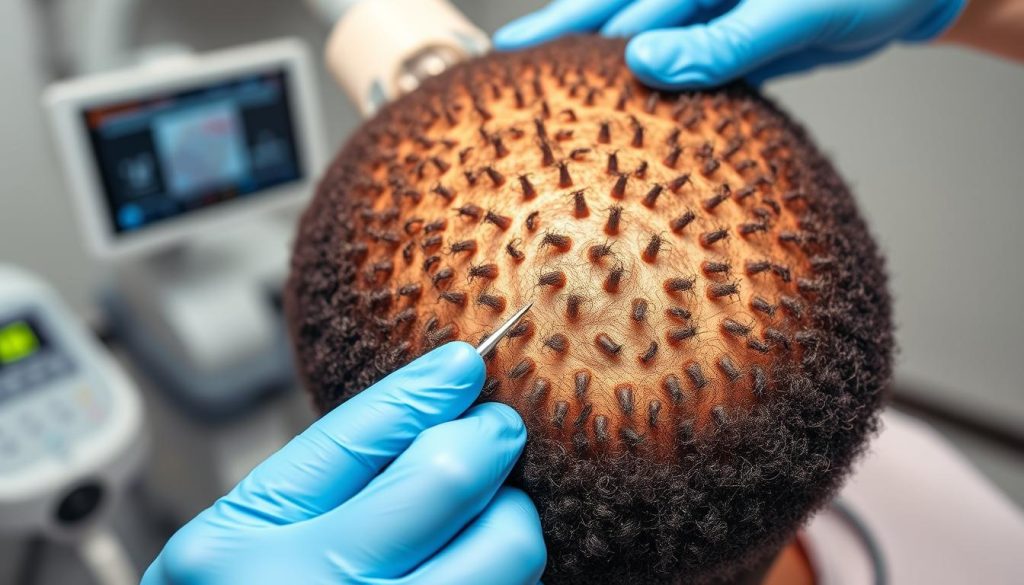
Afro-American hair transplant procedures have made great strides thanks to science. These advances tackle the special needs of kinky hair, leading to natural-looking outcomes for those looking to boost their self-confidence.
The science behind natural hair transplant for African Americans aims to keep the hair’s unique texture and curl pattern. Surgeons employ special methods to take out and put in individual follicles, keeping the hair’s natural look.
“The key to successful afro-american hair transplants lies in understanding the structural differences of ethnic hair and adapting our techniques,” says Dr. Lisa Johnson, a renowned hair restoration specialist.
Recent studies highlight the importance of the angle of follicle implantation for natural results in kinky hair restoration. This knowledge has led to the creation of custom tools for African American patients.
| Aspect | Traditional Approach | Scientific Innovation |
|---|---|---|
| Follicle Extraction | Standard punch tools | Curved micro-punches |
| Implantation Angle | Fixed angle | Variable angle (15-45°) |
| Graft Preservation | Generic solutions | Customized holding media |
These scientific breakthroughs have greatly boosted the success of afro-american hair transplants. Now, patients get results that look natural and blend well with their hair, bringing back both fullness and confidence.
Common Causes of Hair Loss in Black Communities
Hair loss is a big problem in Black communities. Knowing the causes is important for finding good african-american hair loss treatment options. Let’s look at the main reasons.
Genetic Factors and Family History
Genetics are a big factor in hair loss. If your family members have thinning hair, you might too. This is called androgenetic alopecia and affects many Black men and women.
Lifestyle and Environmental Influences
Your daily habits can hurt your hair. Tight hairstyles, heat styling, and harsh chemicals can damage hair follicles. Stress, bad diet, and not enough sleep also cause hair loss in Black people.
Medical Conditions Affecting Hair Loss
Some health problems can lead to hair loss. Alopecia areata, an autoimmune disorder, is one example. Other issues like thyroid problems and anemia can also cause hair thinning. Treating alopecia in Black patients often means fixing these health issues first.
| Cause | Description | Treatment Approach |
|---|---|---|
| Genetics | Inherited pattern baldness | Medication, hair transplants |
| Lifestyle | Tight hairstyles, heat damage | Change in hair care routines |
| Medical | Alopecia areata, thyroid issues | Treat underlying condition |
Knowing these causes is the first step to fight hair loss. Whether it’s genetics, lifestyle, or health issues, there are solutions. Talking to a doctor who knows about Black hair can help find the best treatment for you.
Modern Techniques in Ethnic Hair Restoration
Ethnic hair transplant procedures have seen big improvements. These new methods are designed for textured hair, giving African American patients natural results. Surgeons use special tools and techniques to handle curly, coily hair types.
One new method uses custom punch tools. These tools help take hair follicles out carefully, without harming the area around them. This is great for tightly curled hair, as it reduces scarring and boosts results.
Another big step is in how hair grafts are placed. Surgeons now use special devices for more precise placement. This matches the natural growth of ethnic hair, making the results look more real.
“The key to successful ethnic hair restoration lies in understanding the unique characteristics of textured hair and applying tailored techniques,” says Dr. Lisa Johnson, a renowned hair restoration specialist.
Let’s compare traditional and modern ethnic hair transplant techniques:
| Aspect | Traditional Techniques | Modern Techniques |
|---|---|---|
| Graft Extraction | Standard punch tools | Custom-designed curved punches |
| Implantation | Manual placement | Specialized implantation devices |
| Scarring | More visible | Minimal and less noticeable |
| Natural Appearance | Variable results | Highly natural-looking outcomes |
These new techniques have greatly improved success rates and patient happiness in textured hair transplants.
FUE vs. FUT: Which Method Works Best for Textured Hair?
When looking into an afro-american hair transplant, you might wonder about Follicular Unit Extraction (FUE) and Follicular Unit Transplantation (FUT). Both have their own benefits for black hair restoration. But, they work better for different people and hair types.
Benefits of FUE for African American Patients
FUE is popular for curly hair transplants. It takes hair follicles one by one from the scalp. For African Americans, FUE means less scarring and faster healing. It’s great for tight curls because it places grafts just right.
Understanding FUT in Black Hair Restoration
FUT, or the strip method, takes a strip of scalp. It might leave a scar, but it’s good for big hair restoration jobs. It can give more grafts at once, which is good for those needing a lot of hair.
Recovery and Healing Differences
FUE and FUT have different recovery times. FUE heals faster with less pain. But, FUT takes longer to heal because of the bigger cut. When choosing, think about how you’ll feel and look in the short and long term.
| Method | Scarring | Recovery Time | Graft Yield |
|---|---|---|---|
| FUE | Minimal | Shorter | Moderate |
| FUT | Linear scar | Longer | Higher |
Natural-Looking Results: Achieving the Perfect Hairline
Creating a natural-looking hairline is key in ethnic hair transplant procedures. Skilled surgeons blend art and science to make sure the transplanted hair looks like it belongs. This is vital for getting real results in natural hair transplant procedures for African American patients.
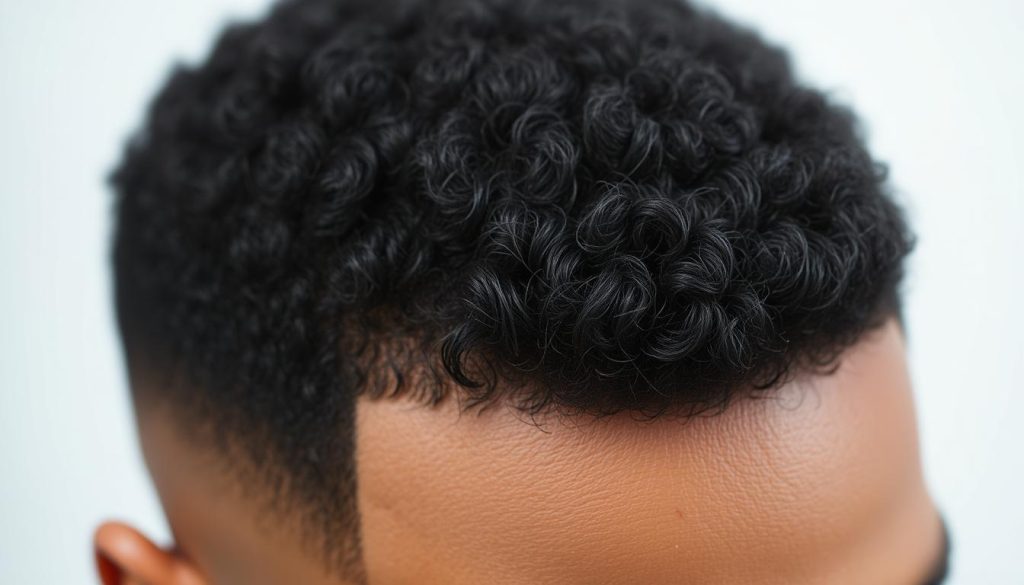
The success of kinky hair restoration depends on the careful placement of hair follicles. Surgeons look at the patient’s facial features, original hairline, and natural hair growth patterns. This careful attention ensures a hairline that looks natural and fits the individual’s unique look.
During the transplant, doctors use special techniques to match the natural direction and angle of hair growth. This makes sure the new hairline blends well with existing hair, creating a seamless look. The end result is a restored hairline that looks and feels completely natural.
“A well-executed ethnic hair transplant should be undetectable, even under close scrutiny. The goal is to restore not just hair, but confidence.”
Aftercare is important for the best results. Patients are told to follow specific aftercare instructions to help the new hair grow well and keep its natural look. With the right care and expertise, ethnic hair transplants can give long-lasting, natural-looking results that boost both appearance and self-esteem.
Post-Transplant Care for Kinky and Coily Hair Types
Proper care after an afro-american hair transplant is key for lasting results. Textured hair needs special care to keep your new hair healthy and looking good.
Essential Aftercare Products
Choose gentle, sulfate-free shampoos and moisturizing conditioners for ethnic hair. Look for products with natural oils like jojoba or argan to keep your scalp nourished. A leave-in conditioner can help manage dryness and frizz common in kinky hair types.
Maintenance Routines
Wash your hair gently with lukewarm water to avoid irritating the scalp. Pat dry with a soft towel instead of rubbing. Avoid tight hairstyles that can strain newly transplanted follicles. Use a wide-tooth comb to detangle, starting from the ends and working your way up.
Long-term Hair Health Strategies
Protect your hair while sleeping with a silk or satin pillowcase to reduce friction. Regular trims every 8-10 weeks help prevent split ends. Consider protective styles like loose braids or twists to minimize manipulation. Stay hydrated and maintain a balanced diet rich in vitamins A, C, and E to support healthy hair growth after your ethnic hair replacement procedure.
| Time Frame | Care Recommendation |
|---|---|
| Week 1-2 | Avoid washing, minimal touching |
| Week 3-4 | Gentle washing, light moisturizing |
| Month 2-3 | Resume normal care routine |
| Month 4+ | Full styling, coloring allowed |
Cost Factors in Ethnic Hair Transplantation
Understanding the cost of black hair restoration is key for those thinking about it. The cost of ethnic hair transplant varies due to several factors. It’s important to know what affects the price.
The amount of hair loss is a big factor in cost. More hair loss means more grafts, which raises the price. The technique used, like FUE or FUT, also affects the cost. FUE is often more expensive because it’s more detailed and leaves less scarring.
Surgeon expertise is another important factor. Experts in treating african-american hair loss may charge more. But, their experience can lead to better results. The location of the clinic also plays a role, with cities usually having higher prices.
| Procedure Type | Average Cost Range | Typical Graft Count |
|---|---|---|
| FUE for Black Hair | $4,000 – $15,000 | 1,500 – 3,000 |
| FUT for Ethnic Hair | $4,000 – $10,000 | 1,500 – 3,000 |
| Advanced Techniques | $10,000 – $25,000 | 3,000 – 5,000 |
Keep in mind, these prices are just estimates. Your specific needs will affect the final cost of your ethnic hair transplant. Many clinics offer financing options to help make this investment easier.
Choosing the Right Surgeon for Black Hair Restoration
Finding the perfect surgeon for your afro-american hair transplant is key. The right expert can make a big difference in your results. Let’s look at how to pick a qualified professional for your ethnic hair transplant journey.
Expertise in Ethnic Hair Types
Search for surgeons with lots of experience in textured hair transplantation. They should know the special challenges and techniques for African American hair. Ask about their training and success with ethnic hair types.
Portfolio Assessment Guide
Check before-and-after photos of previous afro-american hair transplant patients. Look at hairline design, density, and how natural it looks. A skilled surgeon’s portfolio should show consistent, impressive results across different ethnic hair textures.
Questions to Ask Your Surgeon
Make a list of questions for your consultation. Ask about their approach to textured hair transplantation, expected results, and possible risks. Also, ask about their experience with ethnic hair types like yours.
“A surgeon’s expertise in afro-american hair transplants can significantly impact your results. Choose wisely, and don’t be afraid to ask tough questions.”
Remember, the right surgeon will focus on your unique needs and have a good track record with ethnic hair transplants. Take your time to make this important decision. This will ensure the best outcome for your hair restoration journey.
Timeline and Recovery Expectations
Knowing how long it takes to recover is key for those thinking about a natural hair transplant or ethnic hair replacement. The time it takes for African-American hair loss treatment can vary. But, it usually follows a similar pattern.
The first week after surgery is very important. You might see swelling and feel some pain. It’s important to wash your hair carefully and avoid hard work. By the second week, most signs of the surgery will start to disappear.
Months 2-3 are the ‘shedding phase’. It’s normal, so don’t worry. New hair growth usually starts around month 4. By month 6, you’ll start to see big changes.
“Patience is key. Full results from ethnic hair restoration can take up to a year.”
Here’s a table showing what to expect during recovery:
| Timeline | Expected Progress |
|---|---|
| Week 1-2 | Initial healing, scab formation |
| Month 1-3 | Shedding phase begins |
| Month 4-6 | New growth starts |
| Month 7-12 | Continued growth, visible density improvement |
| 1 Year+ | Full results visible |
Keep in mind, everyone’s recovery is different. Things like age, hair type, and health can affect how fast you heal. Going back to your surgeon for check-ups helps make sure you get the best results from your African-American hair loss treatment.
Managing Scarring in African American Skin
Scarring is a big worry in black hair restoration and ethnic hair transplant. African American skin often gets keloids. It’s important to manage this to get good results. Let’s look at ways to stop keloids and lessen scarring in alopecia treatment for black patients.
Keloid Prevention Strategies
To stop keloids, start with the right surgery. Doctors skilled in ethnic hair transplants use special tools. This reduces harm to the skin.
After surgery, it’s key to avoid scratching or irritating the area. Silicone sheets or gels can help keep the skin moist. This aids in healing.
Treatment Options for Minimal Scarring
If scars do form, there are ways to make them less noticeable. Steroid injections can flatten and soften keloids. Laser therapy can also make the skin look better.
For some, using creams with vitamin E or onion extract can help. These can make scars less visible.
| Treatment | Benefits | Duration |
|---|---|---|
| Steroid Injections | Flattens and softens keloids | Multiple sessions over months |
| Laser Therapy | Improves skin texture and color | 4-6 sessions, spaced weeks apart |
| Topical Treatments | Reduces scar visibility | Daily application for several months |
Managing scars well is essential for natural-looking results in black hair restoration. By using prevention and targeted treatments, patients can enjoy hair transplantation with little scarring.
Alternative and Complementary Hair Loss Treatments
There are many ways to treat African-American hair loss, not just natural hair transplants. Black patients often look for alopecia treatments that work alongside or instead of surgery. These options give hope to those wanting to grow back their hair or control loss.
Scalp micropigmentation is becoming more popular among African Americans. It’s a non-invasive method that makes hair look fuller by tattooing pigment into the scalp. It works well for tightly coiled hair textures, giving a look similar to a closely cropped style.

Platelet-rich plasma (PRP) therapy is another hopeful treatment for black patients. It uses the patient’s own blood cells to boost hair growth. It can be used on its own or to improve the results of a natural hair transplant.
Low-level laser therapy (LLLT) devices are also gaining attention. These at-home treatments use light to help hair grow. They’re great for those in the early stages of hair loss.
“I tried LLLT after my doctor recommended it, and I’ve seen significant improvement in hair thickness,” shares a satisfied patient.
For natural remedies, essential oils like rosemary and peppermint are promising. They can help hair grow when applied to the scalp. These oils can be added to hair care routines, providing a gentle way to fight hair loss.
Success Stories and Real Patient Experiences
Every person’s journey with black hair restoration is different. Many African Americans have gained confidence through successful hair replacement. Let’s look at some inspiring stories from those who’ve had afro-american hair transplants.
Michael, a 42-year-old businessman, fought hair loss for years. He chose FUE transplantation after researching. “I was nervous, but the results are amazing. My hairline looks natural, and I feel like myself again,” he says.
Tanya, a 35-year-old teacher, chose FUT surgery for her thinning crown. She notes, “The recovery was easier than I thought. Now, six months later, my hair is fuller than ever. It’s truly life-changing.”
“My afro-american hair transplant gave me back my identity. I can style my hair any way I want now,” – James, 38, musician.
These stories show how modern hair restoration techniques change lives for African American patients. They gain more self-esteem and social confidence, affecting more than just their looks.
| Patient | Age | Procedure | Key Benefit |
|---|---|---|---|
| Michael | 42 | FUE | Natural hairline |
| Tanya | 35 | FUT | Fuller crown |
| James | 38 | FUE | Versatile styling |
These experiences show that with the right approach and care, black hair restoration can lead to amazing results. Each story proves the progress in ethnic hair replacement techniques.
Future Innovations in Ethnic Hair Transplantation
The world of afro-american hair transplant is changing fast. New tech is coming that will make textured hair transplants look more natural. Scientists are working on cloning hair follicles, which could give an endless supply of donor hair.
Stem cells are also being used in hair transplants. This method might help grow new hair and make transplants more successful. Researchers are looking into new ways to help afro, making the process easier for patients.
Artificial intelligence is also playing a big role in ethnic hair restoration. AI tools can help surgeons plan transplants that fit each person’s hair growth perfectly. These new ideas could lead to even better results and happier patients in the future.
FAQ
Q: What makes African American hair transplants unique?
A: African American hair transplants stand out because of textured hair’s unique traits. Curly or coily hair follicles need special care for natural-looking results. Surgeons must consider hair growth angles, follicle density, and the risk of keloid scars in African American skin.
Q: Are FUE or FUT better for African American hair transplants?
A: Both FUE and FUT can work well for African American hair transplants. FUE is often chosen for its less invasive nature and lower risk of scarring. Yet, the best choice depends on your hair type, hair loss extent, and desired look. Talk to a specialist to find the right method for you.
Q: How long does it take to see results from an African American hair transplant?
A: Results from African American hair transplants take about as long as in other ethnicities. You might start seeing growth in 3-4 months. Noticeable improvements come by 6-9 months, and full results by 12-18 months. Everyone grows hair at their own pace, so be patient.
Q: What are the most common causes of hair loss in African Americans?
A: Hair loss in African Americans often comes from genetics, tight hairstyles, and medical conditions. Lifestyle, stress, and certain meds can also play a part. These factors can lead to hair loss in the African American community.
Q: How can I find a surgeon experienced in African American hair transplants?
A: To find a skilled surgeon for African American hair transplants, look for board-certified dermatologists or plastic surgeons. Check their portfolios for African American patient results, read testimonials, and schedule consultations. This will help you understand their approach to textured hair.
Q: What is the average cost of an African American hair transplant?
A: The cost of an African American hair transplant varies. It depends on hair loss extent, technique, and surgeon’s experience. Prices range from ,000 to ,000 or more. Look for quality and experience over cost when choosing a surgeon.
Q: How can I minimize scarring after an African American hair transplant?
A: To reduce scarring, follow your surgeon’s post-op instructions carefully. Use prescribed treatments, avoid direct sunlight, and skip tight hairstyles. Some surgeons might suggest silicone treatments or low-level laser therapy for better healing and less scarring.
Q: Are there any non-surgical alternatives to hair transplants for African Americans?
A: Yes, there are non-surgical options for African Americans facing hair loss. Topical treatments, oral meds, PRP therapy, low-level laser therapy, and scalp micropigmentation are available. These can be used alone or with hair transplantation for a complete hair restoration.
Q: How should I care for my transplanted hair after the procedure?
A: After a transplant, care for your hair gently and moisturize it. Use sulfate-free shampoos and conditioners as recommended. Avoid heat styling and chemical treatments for weeks. Eat a healthy diet to support hair growth. Your surgeon will give you a detailed care plan for your hair type.
Q: Can African American women undergo hair transplant procedures?
A: Absolutely! African American women can benefit from hair transplant procedures. Techniques for women are similar to men’s, but focus on natural-looking hairlines and specific hair loss patterns. Consult with a specialist experienced in treating African American female hair loss for personalized advice.












